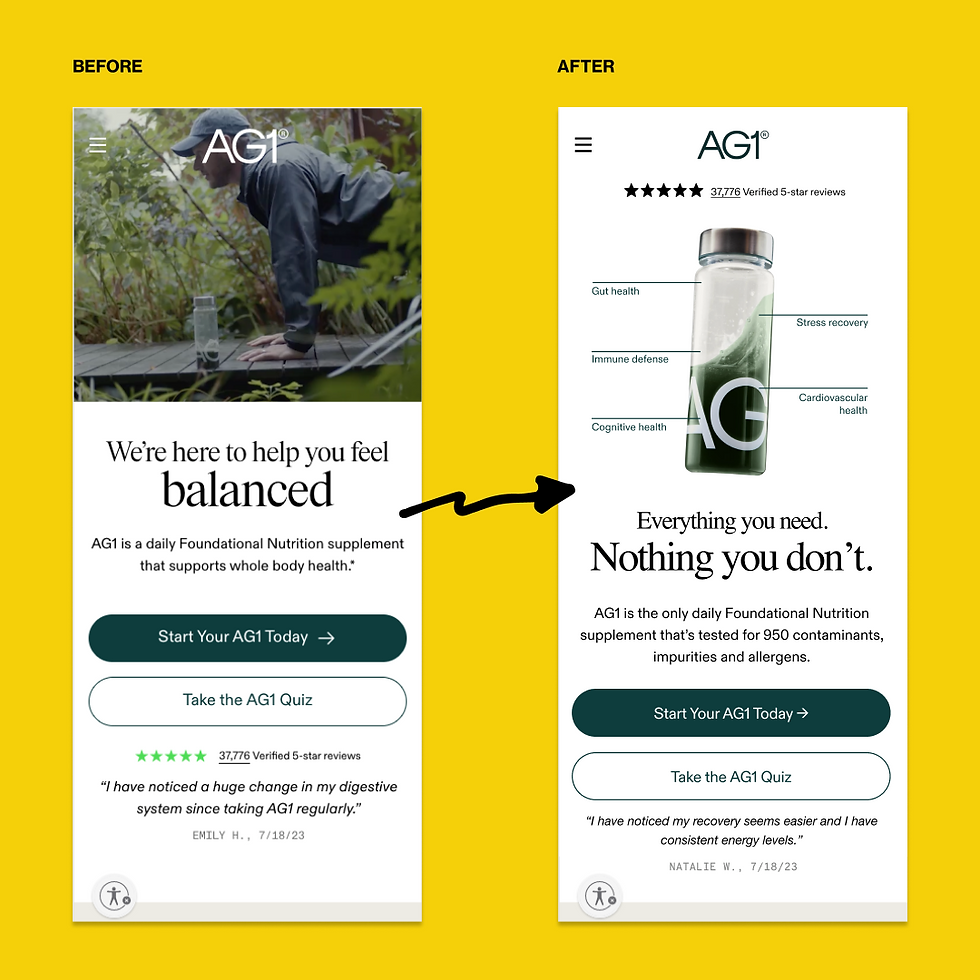When I hear CMOs and DTC operators complaining about poor sales and low conversion rates, it often means they have a brand positioning problem.
Brand positioning is deciding who you're going after and what you're going to say to get them to buy what you're selling. And most sales problems come from not saying the right kind of thing to the right kind of people.
Much like polishing a 💩, no amount of CRO auditing and A/B ad testing can save a brand from poor positioning.
Instead of focusing on website and advertising optimizations, brands struggling with sales should instead be figuring out who they're for and what makes them different.
Let's use AG1, a popular subscription greens supplement, as an example.

On the surface, everything looks great.
The homepage is well designed, with lifestyle videos setting the mood and beautiful photography that demonstrates the diverse range of ingredients, users, and benefits. The product is well explained, and there's lots of convincing customer testimonials and research to back-up their health benefit claims.
But on second glance, something feels off.
By showing such a diverse group of users (older people! younger people! sporty people! busy moms with kids!), and a range of health benefits (gut health! focus and energy! stress reduction! immune defence!), three things happen:
You start to feel overwhelmed and confused
You start to doubt the claims ("can it really do all that?")
You don't actually know if this is for you
Don't be everything to everyone
Companies love throwing the kitchen sink at people to try and cover every possible angle. "Our product can do this, it can do that, you can use it if you're old, or young, or even middle aged!"
For AG1, this is reflected in their focus on 'whole body health' - it helps you feel healthy, energized, balanced, strong, and focused. It's for older people who want to stay fit, but it's also for busy parents who don't have time to eat right, and also for younger people to help regulate stress, and people with digestive issues, and... (the list keeps going)

But instead of enticing more people to try the product, this lack of focus often turns people off altogether.
Because when you look at the competition, they're all making the same generic claims as well. And when your competitors are cheaper than you, people really start to question if your product is worth it.

To reduce comparisons and create a premium market-of-one, you need to identify and double down on what makes you special.
AG1 needs to resonate with the people who will most appreciate the unique and ownable benefit that they bring to the table: their rigorous independent quality and safety processes.
How to stand out and charge more
AG1 is currently the only supplement that's NSF Certified for Sport, something high-performing athletes look for to ensure products don't contain unsafe levels of contaminants, prohibited substances or masking agents.
Who will that matter to the most?
Given their premium price point, it makes sense to prioritise an older demographic who want to stay fit and can afford to spend $80+ per month on supplements.
What happens if we meld the themes of purity, potency, and safety, with an older, less price sensitive demographic who want to maintain peak physical performance?

Shifting the focus from a commoditized list of ingredients and generic health benefits to 'purity and potency' can justify their premium prices and give them the creative foundation to run ads that say something truly unique and compelling.

Focusing on a narrower audience gives you a broader creative palette to play with. You become less connected to the (often boring) list of ingredients and features, and tap into more powerful feelings and emotions that really drive sales.
You start to create a brand.

Better positioning is better business
I'm not saying these ads are better than what AG1 has made in the past, or even that they're good ads in and of themselves. Maybe targeting older people who want to stay fit is a poor strategy altogether.
But they illustrate the impact of focusing on a specific audience with a specific message, which comes from a clear and compelling brand positioning rooted in the product itself.
Whether it's nutritional supplements, clothes, or beauty products, your brand positioning should always do the same thing: be something for someone; not everything to everyone.
You'll turn some people off - but you'll also resonate more with the people who are willing to pay a premium for what you're selling.
And that's just good business.
Comentarios